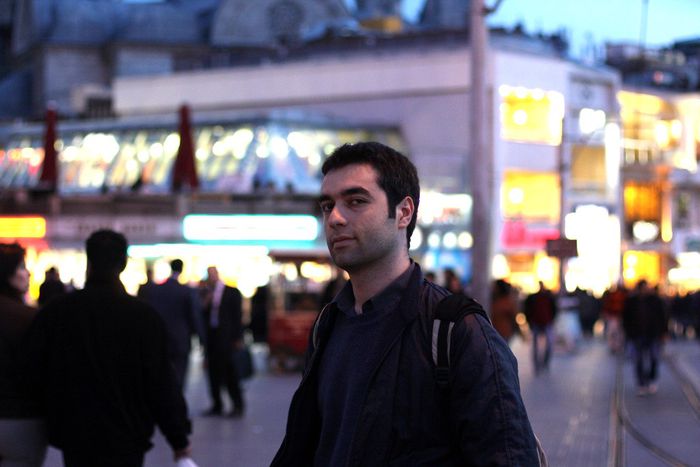
Meeting 4 of 500, 000 'Almanci' German Turks who returned 'home' over last 30 years
Published on
Translation by:
 hkeet
hkeet
After growing up in Germany these men have chosen to turn their backs on their native country to return to their homeland, Turkey. In Istanbul the 'Almanci' as they are called - with slightly negative connotations - are Hasan, Cengiz, Hazar and Cigdem. They tell us the story of their return to the banks of the Istanbul Strait
From the top of the restaurant that he works in on the Galata Bridge, Hasan has an unspoilable view: on the right is the historic district of Istanbul called Eminönü and the New Mosque which is heated in the April sun. On the left, Beyoglu and modern Istanbul stand on the hills. Beneath his feet are the turquoise waters of the Golden Horn estuary, which flows into the Istanbul Strait. 'I feel at home here,' says Hasan. 'I feel European and Istanbul is Europe.' However, Hasan has spent the biggest part of his life far away from the shores of the Black Sea, where he was born. He lived in the Ruhr — the industrial region of west Germany — for twenty-five years.
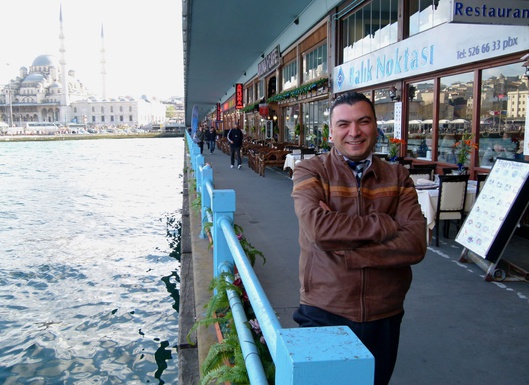 Hasan tells his story of a journey with a return ticket in perfect German with a cup of tea in his hand. 'My father went to Germany in 1964 as a migrant worker in the mines,' says Hasan. 'I joined him in the Ruhr in 1973; I was barely three months old. As a kid, integration did not go well. At school I had several bad experiences. We lived in a Turkish district and many of the elderly did not speak German properly. The youngsters were able to learn the language at school. At home, it was like being in Turkey. By crossing the threshold, I was in Europe, but I always felt Turkish, especially since I was made aware of this identity at every possible opportunity.'
Hasan tells his story of a journey with a return ticket in perfect German with a cup of tea in his hand. 'My father went to Germany in 1964 as a migrant worker in the mines,' says Hasan. 'I joined him in the Ruhr in 1973; I was barely three months old. As a kid, integration did not go well. At school I had several bad experiences. We lived in a Turkish district and many of the elderly did not speak German properly. The youngsters were able to learn the language at school. At home, it was like being in Turkey. By crossing the threshold, I was in Europe, but I always felt Turkish, especially since I was made aware of this identity at every possible opportunity.'
Prospects
Hasan set up his business as a craftsman in Bielefeld, in the Ruhr. His parents returned to Turkey in 1996 to go into retirement, and then his father fell ill. 'I am the eldest child, so I’m the one responsible for my parents now,' he adds. Thus the fortunes of life forced Hasan to move to Turkey. 'At first it was a bit difficult, because after twenty-five years in Germany, my Turkish was not very good. The environment was totally foreign to me. Apart from the food,' he laughs. 'My mother taught me all about Turkish cuisine.' But Hasan adapted quickly and has found there are plenty of prospects in Istanbul. He now works as a head-waiter in a seafood restaurant on the Galata Bridge. Hasan has not set foot in Germany for four years: it's a life between two cultures and a bridge between two shores.
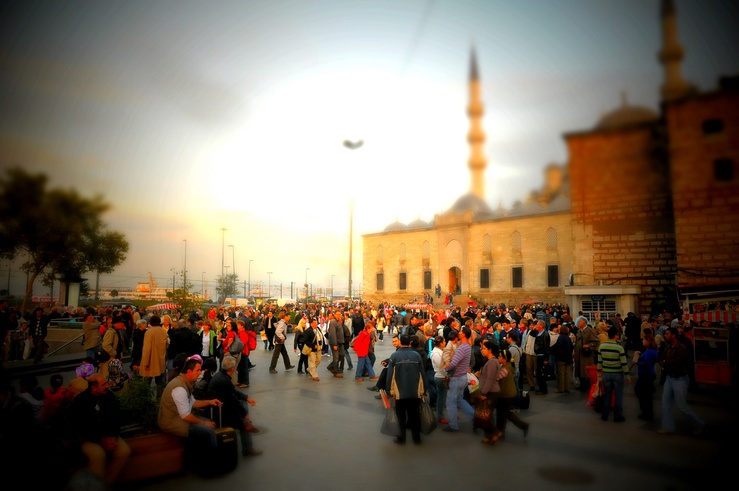
Hasan’s fate is shared by many Turks. Last year, about 40, 000 of them left Germany to return 'home'. That number has risen to a total of 500, 000 in the last thirty years. Since 2005, there have been more Turks leaving Germany than going there. The number of people of Turkish origin in Germany is now around 2.7 million. One third of them have German citizenship. 'There are two main reasons for this returning phenomenon,' says professor Ayhan Kaya, director of the institute of European studies at Istanbul Bilgi University. 'The first is economic: Turkey is a booming country in very high demand. Those who can speak both German and Turkish have very good employment prospects. The second reason is the rise of islamophobia, racism and 'anti-Turkishness' in Europe. Those who return often belong to the middle class or higher and they are tired of this debate on integration. However, returning to Turkey is not easy. The working class, who do not necessarily have contacts in Turkey, may prefer to stay in Germany.' The use of the terms islamophobia and anti-Turkishness shows that professor Kaya’s judgement is harsh towards the German and French governments: 'Germany and France are in the process of losing their own people. But some people are interested in continuing the debate on immigration to hide their internal problems.'
Who's the boss, where?
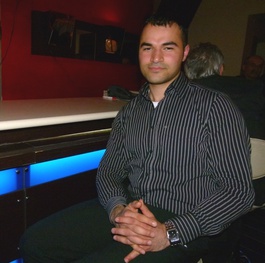 To share their experiences, the so-called Almanci now meet once a month in Istanbul for a 'Rückkehrer-Stammtisch' — a typically German term to describe the meeting of 'those who returned'. With the backdrop of city lights on this April evening, the sixty guests exchange stories in both Turkish and German. Everyone has their story — they are all different yet similar. Cengiz, who seems jovial in his grey suit, explains it like this: 'In Germany, I could never have become a bank manager. Why do I have to always remain the number two? I did not want to be ‘the Turk’. I got fed up of it. It's not that I hate Germany, far from it. I learned a lot out there.' Hazar, who has just turned twenty-four, tells a similar story. He has just returned to Istanbul after having spent ten years in Bavaria and after finishing his studies in Munich. 'In Turkey I saw an opportunity to progress rapidly. With my German education, I have an advantage in the Turkish market. In Germany I would not have had this opportunity.'
To share their experiences, the so-called Almanci now meet once a month in Istanbul for a 'Rückkehrer-Stammtisch' — a typically German term to describe the meeting of 'those who returned'. With the backdrop of city lights on this April evening, the sixty guests exchange stories in both Turkish and German. Everyone has their story — they are all different yet similar. Cengiz, who seems jovial in his grey suit, explains it like this: 'In Germany, I could never have become a bank manager. Why do I have to always remain the number two? I did not want to be ‘the Turk’. I got fed up of it. It's not that I hate Germany, far from it. I learned a lot out there.' Hazar, who has just turned twenty-four, tells a similar story. He has just returned to Istanbul after having spent ten years in Bavaria and after finishing his studies in Munich. 'In Turkey I saw an opportunity to progress rapidly. With my German education, I have an advantage in the Turkish market. In Germany I would not have had this opportunity.'
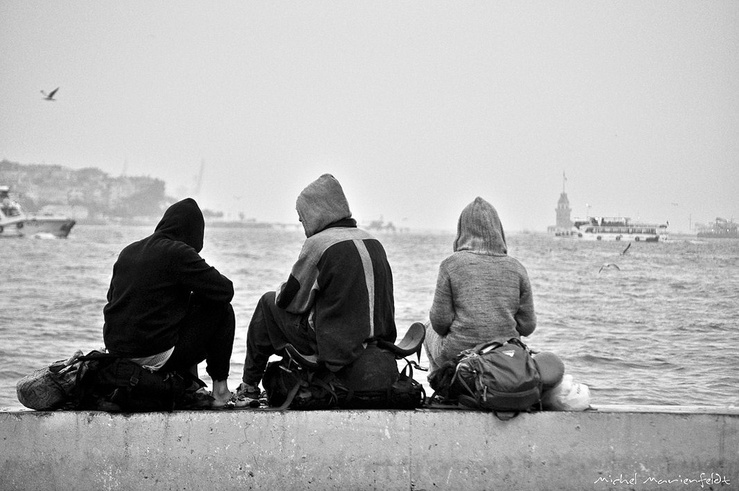
Boosted by his experience in the two countries, Cengiz even distances himself from the migratory fluxes. 'We have inevitably changed the German culture by bringing a touch of Mediterranean life with us. Similarly, we are also changing Turkish society, for example, with new working methods.' But the political debate in Germany — like elsewhere in Europe — largely ignores the reality that the streets of Istanbul are bursting with dynamism. Even though Germany lacks skilled workers and its population is aging, it is not capable of keeping those who have lived there for ten, fifteen or twenty years and have completed all or part of their schooling there. Exactly fifty years ago the agreement to send migrant workers to Germany was signed between Turkey and Germany. The writer Max Frisch was famously quoted on this subject: 'We asked for workers. We got people instead.' Today, Germany is still needs workers, but these men have already taken their return ticket back to their home country.
This article is part of cafebabel.com’s 2010-2011 feature focus on the Balkans - read more about the project Orient Express Reporter and read articles from the mission here
Images: main (cc) burax/ Flickr; Hasan © Sébastien Vannier; Sultanahmet (cc) Liquid Oh/ Flickr; Hazar © Sébastien Vannier; Bosphorus views (cc)telomi/ Flickr
Translated from Turquie-Allemagne : billet aller-retour


